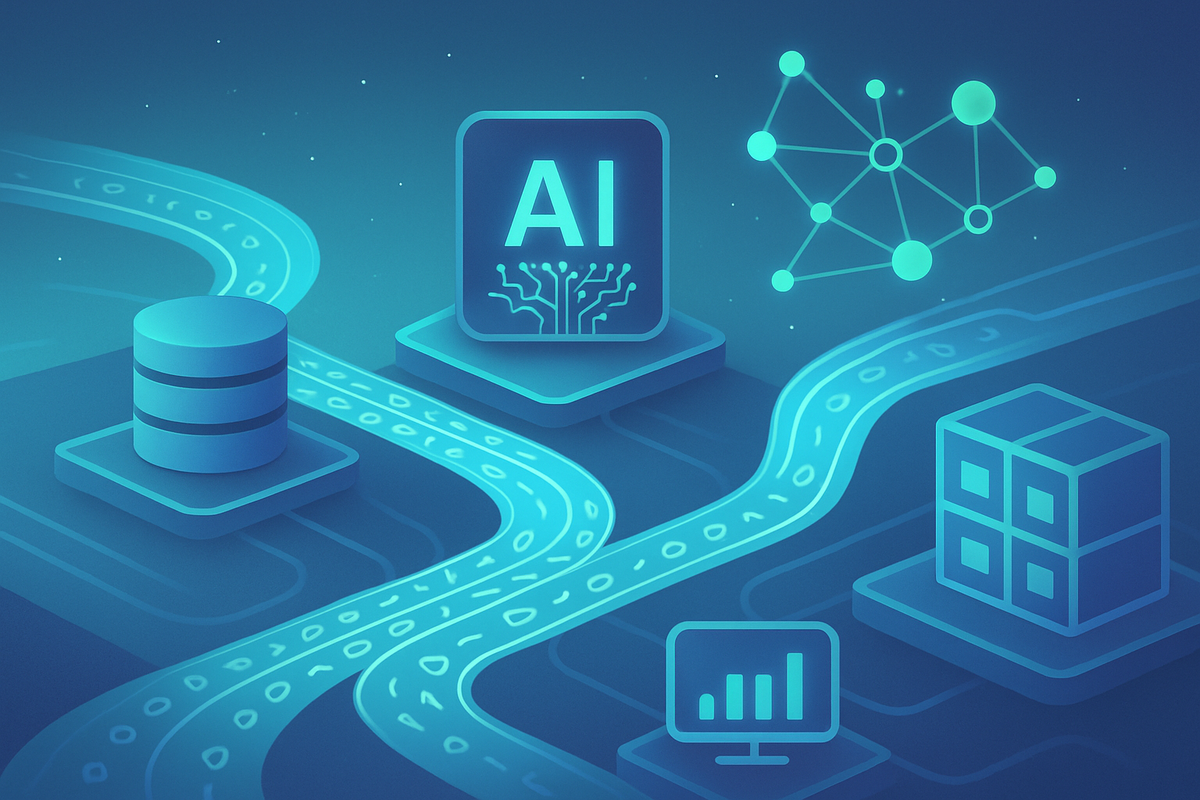
Snowflake (NYSE: SNOW) is aggressively moving to dismantle the barriers hindering AI development by making data more accessible and interoperable. With a suite of initiatives including the new Open Semantic Interchange (OSI) alongside industry giants like Salesforce (NYSE: CRM) and BlackRock (NYSE: BLK), and enhanced AI capabilities through Snowflake Cortex AI, the company aims to end the fragmented "AI data-access wars." This strategic pivot is set to significantly accelerate AI adoption across enterprises by standardizing data semantics and enabling AI development directly on the data, promising a future where insights are consistent and readily available. The immediate implications for the tech industry are profound, signaling a collaborative shift towards open standards and a democratization of AI development, while intensifying competition in the burgeoning "AI data cloud" market.
The Battle for Unified Data: Snowflake's Multi-Front Offensive
Snowflake's comprehensive strategy to democratize data access for AI applications is a multi-front offensive, addressing critical pain points that have historically plagued AI development. At its core, the company is pushing for interoperability, integrating AI capabilities directly into its data platform, bolstering robust governance, and fostering the broader AI ecosystem. This approach is exemplified by several key developments and partnerships, all designed to simplify AI development and ensure data consistency.
A pivotal moment came with the announcement on September 23, 2025, of the Open Semantic Interchange (OSI) initiative. Spearheaded by Snowflake, this collaborative effort includes major industry players such as Salesforce, BlackRock, dbt Labs, RelationalAI, Mistral AI, and Tableau. The OSI aims to establish a common, vendor-neutral semantic model specification, creating an open-source framework to standardize how semantic metadata is defined and shared across diverse platforms. This initiative directly tackles the "semantic chaos" that often leads to inconsistent interpretations of business metrics across AI and Business Intelligence (BI) applications, a critical hurdle for trusted AI insights. By providing a universal language for data, the OSI seeks to accelerate AI and BI adoption by improving interoperability and streamlining processes.
Complementing its push for open standards, Snowflake has significantly enhanced its integrated AI capabilities through Snowflake Cortex AI. Generally available since May 2024, Cortex AI embeds large language models (LLMs) and machine learning (ML) functionalities directly within the Snowflake Data Cloud. This allows users to process unstructured data, answer freeform questions, and build custom ML models without the cumbersome and often insecure process of moving data out of Snowflake's secure environment. Features like Cortex AISQL and LLM functions enable data teams to leverage pre-built LLMs for tasks such as summarization and classification using familiar SQL syntax, while Snowflake Copilot, an LLM-powered assistant, aids analysts in data analysis and SQL query building. The company also introduced Document AI for extracting information from various document types, and offers capabilities for Cortex Fine-tuning and Custom Models, ensuring tailored AI outcomes. Critically, Snowflake emphasizes that all AI models within Cortex operate under its stringent security and governance perimeter, ensuring customer data privacy and compliance.
Further bolstering its commitment to open standards and flexibility, Snowflake has embraced Iceberg Tables, utilizing the Apache Iceberg open table format. This allows data to be stored externally in cloud object storage (e.g., Amazon S3 (NASDAQ: AMZN), Google Cloud Storage (NASDAQ: GOOGL), Azure Blob Storage (NASDAQ: MSFT)) while still being managed and queried by Snowflake's engine. This move provides greater flexibility and interoperability, enabling data lakes to be used by multiple systems like Spark, Trino, and Flink simultaneously, and supports features such as ACID transactions and time travel. To ensure consistency and trust across these diverse data environments, Snowflake Horizon serves as the company's built-in governance solution, providing a unified set of compliance, security, privacy, and access capabilities across data, applications, and models within the AI Data Cloud. This comprehensive governance extends to Iceberg tables, allowing for the secure management of externally stored data. Finally, recognizing the importance of fostering innovation, Snowflake launched "Snowflake for Startups" in September 2025 at its Silicon Valley AI (SVAI) Hub. This initiative provides startups with access to enterprise-grade AI infrastructure, including Cortex AI, free usage credits, technical expertise, and connections to venture capital firms and potential customers, further solidifying Snowflake's role in the AI ecosystem.
Shifting Sands: Potential Winners and Losers in the AI Data Landscape
Snowflake's aggressive push to democratize AI data access and standardize semantic layers is poised to create significant shifts in the competitive landscape, creating clear winners and losers among technology companies, data platform providers, and even enterprise users. The implications extend beyond direct competitors, influencing cloud providers, AI solution developers, and data governance specialists.
Potential Winners:
- Snowflake (NYSE: SNOW): Clearly positioned as a major winner, Snowflake aims to solidify its status as "the AI data cloud company." By integrating AI capabilities, promoting open standards, and providing robust governance, it makes its platform more attractive for AI development. The OSI initiative could significantly expand its ecosystem influence, drawing more users and partners to its platform by reducing friction in data integration. Its "Snowflake for Startups" program also creates a pipeline of future AI-centric customers.
- Companies Participating in OSI (Salesforce (NYSE: CRM), BlackRock (NYSE: BLK), dbt Labs, RelationalAI, Mistral AI, Tableau (a Salesforce company)): These partners stand to benefit immensely from the creation of a universal semantic data framework. Salesforce, for instance, can leverage consistent data definitions across its CRM and AI offerings, improving the accuracy and reliability of its Einstein AI. BlackRock, a major financial institution, will gain from more consistent and trusted data for its analytics and investment platforms. Data transformation tools like dbt Labs will find their integration with various data platforms streamlined, while AI model providers like Mistral AI can access more consistently defined data, leading to better model performance.
- Enterprise AI Developers and Data Scientists: These professionals will be significant beneficiaries. Easier access to governed, consistent data directly within the data cloud, coupled with integrated AI tools like Cortex AI, will dramatically accelerate AI project timelines, reduce data preparation overhead, and enable more reliable AI deployments. The elimination of data movement for AI processing also enhances security and compliance.
- Cloud Object Storage Providers (Amazon (NASDAQ: AMZN) S3, Google (NASDAQ: GOOGL) Cloud Storage, Microsoft (NASDAQ: MSFT) Azure Blob Storage): The adoption of Iceberg Tables, which allows data to reside in external cloud object storage while being managed by Snowflake, can drive increased usage of these services. This offers flexibility to customers who prefer to keep their data in their chosen cloud storage while still leveraging Snowflake's compute power.
Potential Losers (or those facing increased pressure):
- Traditional Data Warehouse and Data Lake Vendors (without strong AI/open standards integration): Companies that rely on proprietary data formats or lack robust, integrated AI capabilities and strong commitments to open standards will face intense pressure. If they cannot match Snowflake's interoperability and ease of AI development, they risk losing market share as enterprises gravitate towards more agile and AI-ready platforms.
- Point Solution AI/ML Platforms Requiring Extensive Data Movement: AI/ML platforms that necessitate significant data extraction, transformation, and loading (ETL) into separate environments for model training and inference may see reduced demand. Snowflake's approach of bringing AI to the data within a secure, governed environment directly challenges these solutions by eliminating complexity, cost, and security risks associated with data movement.
- Data Governance and Metadata Management Vendors (who don't embrace open standards): While the need for governance remains, vendors offering proprietary or siloed governance solutions might struggle if the industry coalesces around open semantic frameworks like OSI. Their value proposition could diminish if the core semantic definitions become standardized and openly accessible.
- Companies with Fragmented Data Architectures: Enterprises that have heavily invested in complex, siloed data architectures will find themselves at a disadvantage. The effort to reconcile disparate data definitions and integrate various tools will become more pronounced as competitors leveraging unified, open platforms gain efficiency and accuracy in their AI initiatives. They will face significant pressure to modernize their data stacks to remain competitive.
In essence, Snowflake's strategy is accelerating a broader industry trend towards data unification, open standards, and integrated AI. Companies that adapt by embracing these principles and collaborating within the evolving ecosystem are likely to thrive, while those clinging to proprietary, siloed approaches may find themselves increasingly marginalized.
The Wider Significance: A Paradigm Shift in Data and AI
Snowflake's aggressive pursuit of open standards and integrated AI capabilities represents more than just a product enhancement; it signifies a potential paradigm shift in how enterprises approach data management and artificial intelligence. This strategic direction fits squarely into broader industry trends, promising ripple effects across competitors, partners, and even potential regulatory landscapes.
This event strongly aligns with the growing industry demand for data democratization and interoperability. For years, enterprises have struggled with data silos, proprietary formats, and the arduous task of moving and transforming data for analytical and AI purposes. Snowflake's embrace of Apache Iceberg for external data lakes and its leadership in the Open Semantic Interchange (OSI) initiative directly address these pain points. The OSI, in particular, has the potential to become a foundational standard, much like SQL became for relational databases, or HTTP for the web. By standardizing semantic metadata, it aims to create a "universal translator" for data, ensuring that a "customer" or "revenue" metric means the same thing across different tools and departments, thereby unlocking consistent, trustworthy insights crucial for AI. This move is a direct response to the "semantic chaos" that has historically hampered the adoption and reliability of enterprise AI and BI.
The ripple effects on competitors and partners will be substantial. For direct competitors like Databricks (NYSE: DBX), which also champions open data lake formats, Snowflake's moves intensify the competition in the "AI data cloud" space. While both companies advocate for open standards, their strategies for integrating AI and their ecosystem partnerships will be key differentiators. Other cloud data warehouse providers (e.g., Google (NASDAQ: GOOGL) BigQuery, Amazon (NASDAQ: AMZN) Redshift, Microsoft (NASDAQ: MSFT) Azure Synapse) will face increased pressure to offer equally seamless AI integrations and open semantic capabilities to remain competitive. The involvement of major players like Salesforce (NYSE: CRM) and BlackRock (NYSE: BLK) in the OSI also signals a broader industry consensus on the need for semantic standardization, which could pressure other enterprise software vendors to align with these emerging standards or risk being left behind. Partners in the data and AI ecosystem, from ETL tools to BI platforms and AI model developers, will likely adapt their offerings to leverage these new open standards, potentially leading to a more integrated and less fragmented data landscape.
From a regulatory and policy perspective, the push for open standards and enhanced data governance, especially with Snowflake Horizon, could be seen favorably. As AI adoption grows, concerns around data privacy, algorithmic bias, and accountability are intensifying. By providing robust, built-in governance and a framework for consistent data interpretation, Snowflake's initiatives could help organizations meet evolving regulatory requirements like GDPR and CCPA more effectively, and potentially preempt future regulations related to AI data integrity. The focus on security within Cortex AI, ensuring customer data is not used to train models for other customers, also addresses a significant privacy concern in the AI space.
Historically, the tech industry has seen similar shifts towards open standards driving innovation and growth. The rise of Linux in operating systems, Apache in web servers, and Kubernetes in container orchestration are all precedents where open-source initiatives broke proprietary lock-ins and fostered vast ecosystems. Snowflake's OSI initiative, if widely adopted, could play a similar role for data semantics, democratizing access to consistent, high-quality data for AI at an unprecedented scale. This is not merely a technological upgrade; it's an architectural evolution designed to unlock the full potential of AI by addressing its most fundamental input: data.
What Comes Next: Navigating the Future of AI Data
Snowflake's aggressive strategy to end the "AI data-access wars" sets the stage for a dynamic future in the data and AI landscape, marked by both short-term adaptations and long-term strategic shifts. The coming months and years will reveal the true impact of these initiatives, presenting both significant opportunities and formidable challenges.
In the short term, we can expect an accelerated adoption of integrated AI capabilities directly within data platforms. Enterprises will increasingly prioritize solutions that minimize data movement and offer robust governance for AI workloads, driven by the immediate efficiency gains and enhanced security. The Open Semantic Interchange (OSI) initiative, having just been announced in September 2025, will likely see a rapid push for initial specifications and early implementations. Companies involved in the initiative, and those closely watching, will begin to align their data strategies to leverage this emerging standard, aiming to reduce semantic inconsistencies across their diverse data stacks. This period will also see intensified competition among cloud data platforms, as each vies to offer the most compelling "AI data cloud" experience, focusing on ease of use, performance, and the breadth of integrated AI tools.
Looking at the long term, the success of the OSI could lead to a truly unified and interoperable data ecosystem, where semantic metadata is consistently understood across virtually all enterprise applications and AI models. This would dramatically lower the barrier to entry for AI development, fostering a new wave of innovation built on trusted data. We might see a shift in the role of data engineers and scientists, moving away from extensive data preparation and reconciliation towards more advanced model development and strategic data utilization. Potential strategic pivots or adaptations will be required from many players. Data governance vendors, for instance, will need to integrate deeply with open semantic frameworks. Cloud providers will need to ensure their data services are fully compatible with open table formats like Iceberg and emerging semantic standards. For Snowflake, the challenge will be to maintain its leadership in fostering these open standards while continuing to innovate its proprietary AI capabilities and expanding its ecosystem.
Market opportunities will emerge in several areas. New tools and services will likely be developed to help organizations implement and manage the OSI framework, ensuring semantic consistency across their data estates. Specialized AI applications that leverage this newfound data consistency will flourish, particularly in industries heavily reliant on accurate and integrated data, such as finance (BlackRock's involvement is telling) and healthcare. Conversely, challenges will include the inherent difficulty of achieving widespread adoption for any new open standard, requiring sustained collaboration and consensus among diverse stakeholders. Organizations with deeply entrenched legacy systems may also face significant hurdles in migrating to these new, open architectures. Furthermore, the increased ease of AI development will necessitate even stronger ethical AI frameworks and regulatory oversight to prevent misuse or unintended consequences. The future will be defined by how successfully the industry navigates this balance between innovation, openness, and responsible AI deployment.
The Dawn of a Unified Data Era for AI
Snowflake's concerted efforts to dismantle the "AI data-access wars" mark a pivotal moment in the evolution of enterprise data management and artificial intelligence. By championing open standards, integrating powerful AI capabilities directly into its platform, and fostering a collaborative ecosystem, Snowflake is not merely enhancing its product offering; it is actively shaping the future landscape where data and AI can truly converge. The initiatives, particularly the launch of the Open Semantic Interchange (OSI) alongside key industry players and the expansion of Snowflake Cortex AI, underscore a clear vision: to make consistent, governed data universally accessible for AI applications, thereby unlocking unprecedented innovation and efficiency.
The key takeaways from this strategic pivot are multifaceted. First, the industry is unequivocally moving towards greater interoperability and open standards, recognizing that proprietary silos are detrimental to AI progress. Second, the integration of AI directly into data platforms is becoming a baseline expectation, eliminating the complexities and risks associated with data movement. Third, robust data governance, exemplified by Snowflake Horizon, is no longer an afterthought but a foundational requirement for trusted AI. Finally, the collaborative spirit behind initiatives like OSI signals a maturing industry understanding that some challenges, particularly those related to data consistency, are best solved through collective effort rather than individual competition.
Moving forward, the market will likely reward platforms that prioritize openness, seamless AI integration, and comprehensive governance. Investors should closely watch for several indicators in the coming months. The speed and breadth of adoption for the OSI framework will be crucial; widespread participation will signal its potential to become a true industry standard. Observe how competitors react, specifically if they join the OSI or develop alternative, equally compelling open semantic solutions. Furthermore, monitor the growth and impact of AI applications built on Snowflake Cortex AI and other integrated platforms, as successful deployments will validate the efficacy of this approach. The success of the "Snowflake for Startups" program will also be an important indicator of the company's ability to foster future innovation and customer growth.
Ultimately, Snowflake's strategy represents a bold step towards a unified data era for AI. By addressing the fundamental challenges of data access, consistency, and governance, the company is laying the groundwork for a future where AI is not just a technological capability but an inherent, seamless extension of enterprise data. The lasting impact will be a more efficient, insightful, and democratized AI landscape, but the journey will require continued collaboration, adaptation, and a vigilant focus on ethical and responsible AI development.
This content is intended for informational purposes only and is not financial advice





